At U.N. Security Council, Russia Counters Trump Gaza Plan With Its Own

© Saher Alghorra for The New York Times


© Saher Alghorra for The New York Times


© Reuters
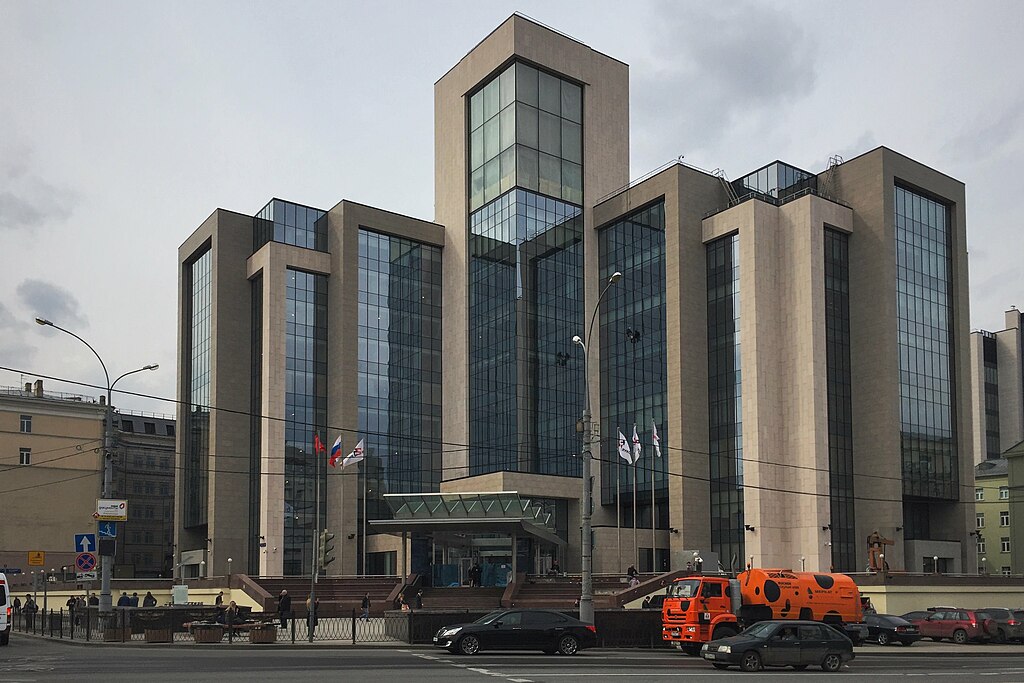

US private equity firm Carlyle is considering acquiring Lukoil’s foreign assets, Reuters reports. The potential deal is unfolding under the pressure of a looming 21 November deadline, when Washington's sanctions will block all transactions with the Russian oil giant.
American company Carlyle has begun exploring the purchase of Lukoil’s foreign holdings, sources familiar with the situation told Reuters. The assets are estimated at $22 billion and include refineries, oilfields, and fuel stations across multiple continents. Carlyle has informed Lukoil of its interest but has not yet begun due diligence.
Before it can proceed, Carlyle plans to apply for a US government license to make the deal legal under existing sanctions. The firm could still walk away from the deal, Reuters reports, depending on the outcome of the license application and timing constraints.
Lukoil had previously tried to sell the same assets to Swiss commodities trader Gunvor. But the US Treasury blocked the transaction, Reuters reported, labeling Gunvor a Kremlin “puppet.” The move forced Gunvor to withdraw. That left Carlyle, which experts told Reuters is more likely to win approval from Washington.
Lukoil has applied for an extension of the 21 November deadline, Reuters reported earlier this week. If the deadline stands, deals involving the company will be banned after that date.
Lukoil’s foreign assets produce 0.5% of the world’s oil and include three refineries in Europe, stakes in oilfields in Kazakhstan, Uzbekistan, Iraq, Mexico, Ghana, Egypt and Nigeria, and hundreds of fuel stations — including some in the US.
The company’s total global output amounts to about 2% of worldwide oil production. Its foreign portfolio, based on 2024 filings, is valued at roughly $22 billion.


© Laetitia Vancon for The New York Times


Taiwanese companies continue to supply precision industrial machines for factories that fuel Russia’s war machine, in defiance of sanctions, according to an investigation by Ukrainian watchdog organization StateWatch.
Precision tools process high-strength alloys used in the production of artillery barrels, missile bodies and drones. Russia imports at least 70% of its Computer Numerical Control (CNC) machines from companies in Europe and Asia. Most countries involved have banned selling Russia equipment that can be used to make war materiel.
Moscow gets around these bans, largely by working with middlemen in countries like China and Türkiye. However, “even Taiwan, a strategic partner of the US, has been implicated in these supply chains,” StateWatch wrote in its 13 November report.
Since 2022, millions of dollars worth of dual-use machinery has made its way into Russia through Taiwan’s involvement. These include brands like Fedek, Sunmill, and Golden Machinery.
The recipients include companies linked to Russia's military-industrial complex, including Zenik, Kami-Group, Intervesp, Metalmash, and Stanki Tekhnologii Instrument.
At least 70% of Russia's CNC machine tools are imported, largely from the US, EU, and Japan. Over 80% of all CNCs end up in Russia's military production facilities.
LNS Group is a global company that manufactures bar feeders and CNC lathes. According to Russian customs data, LNS machines worth nearly $5 million have entered Russia since the start of the full-scale invasion.
These exports were mainly facilitated by Taiwanese company TWT Global Enterprise limited. Kami-Group, which sells machine tools, is the largest Russian recipient, according to the report.
Russian company Zenit published a YouTube video in December 2024, showing LNS’s Fedek-branded equipment at its factory.
A flashlight manufacturer, Zenit also makes red-dot and thermal sights, laser target designators, and tactical firearm accessories for Russia's troops and intelligence agencies, on top of donating products to Russian troops in Ukraine.
Fedek machines have also been spotted at the G.I. Petrovsky Plant in Nizhny Novgorod, which makes equipment for the Russian Navy, engineering troops, and manufactures avionics.
Zenit's video also shows Sunmill machines. The manufacturer, Jeenxi Technology Co, of Taiwan, “supplied high-precision equipment directly to Russia’s military sector” also to the tune of $5 million, as of December 2024, according to StateWatch.
Russian state contractors Intervesp and Intervesp-M, both of which are internationally sanctioned, were reportedly among the recipients.
Taiwanese Golden Machinery Co, which manufactures beverage bottling equipment, supplied $800,000 worth of industrial machines to Russia, according to customs data.
The main recipient was Stanki Tekhnologii, which trades in metalworking equipment and its website shows it regularly signing contracts with Russian defense enterprises.
Stanki Tekhnologii got $430,000 worth of equipment directly from the manufacturer and the rest via a Turkish intermediary.
South Korean brands have also been spotted in Russia, according to a recent report by the Economic Security Council of Ukraine, a Kyiv think tank.
Between 2024 and 2025, more than $3.7 million worth of Korean-made cutting tools and CNC machines got into Russia through complex transshipment networks involving China, Türkiye, India, Uzbekistan, Lithuania and Thailand.
Products from at least three South Korean precision toolmakers were exhibited at the annual Metalloobraboka expo in Moscow in May.
“The key issue is not simply covert shipments,” Olena Yurchenko, director for analysis and investigations at ESCU, wrote in a statement to Korea JoongAng Daily and Euromaidan Press.
“What we find alarming is that products made by South Korean brands, which are de facto banned from Russia [since 2022], are now being openly advertised and promoted in Moscow."
These figures are a drop in the bucket compared to the $18 billion worth of machine tools reportedly supplied to Russia from Europe and China.
This includes 57 CNC machines worth over $26.5 million from European subsidiaries, along with components and consumables valued at more than $9.5 million.
In October, Germany raided Spinner, a high-precision machine tool manufacturer suspected of knowingly supplying equipment to Russia's military industry. Three individuals have already been charged with violating sanctions.
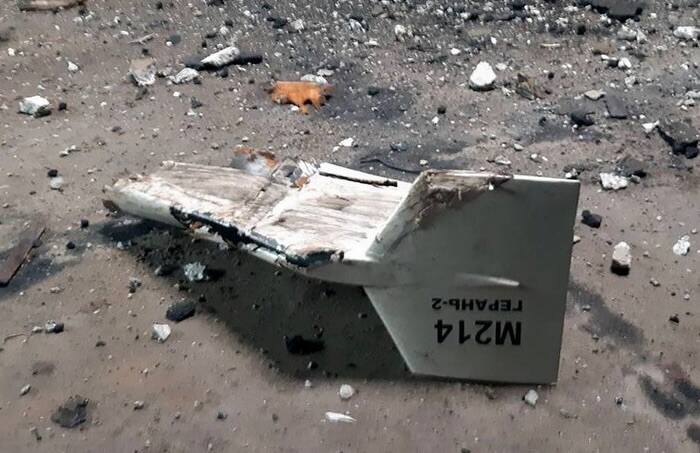

The US has imposed new sanctions on 32 legal entities involved in the supply network for components used to produce Shahed-136 kamikaze drones. Among them are two companies registered in Ukraine, according to the US Department of the Treasury.
The adversary may aim to use this information as “evidence” of corruption, internal collaboration with the enemy, or other theories. While the companies are formally registered in Ukraine, control is effectively in foreign hands.
An Iranian citizen, Bahram Tabibi, “used his Ukrainian shell companies” to “purchase and supply aerospace materials” for the Iran Aircraft Manufacturing Industrial Company, the producer of the Shahed drones.
Since 2022, Iran has been supplying these drones to Russia for attacks on Ukraine, until Moscow established domestic production of the drones, mostly in the Republic of Tatarstan. The Shahed model, assembled in the Alabuga factory, contains 294 imported components. Of those, around 120 come from China and Taiwan, and 100 from the US.
Russia uses three distinct turboprop Shahed drone variants — all packed with foreign parts
The supplies included position indicators, magnetometers, AC generator components, engines, and other equipment.
According to the Opendatabot portal, LLC "GK Imperativ Ukraine" was registered in 2018 in Kharkiv and is engaged in trade. The company’s owner is an Iranian citizen, Bahram Tabibi Jabali.
As for LLC "Ecofera," no publicly available information has been found.


Ukrainian forces are disrupting the plans of Russian invaders. Commander of the Unmanned Systems Forces Robert Brovdi, also known as Madiar, reports that Ukrainian soldiers destroyed a storage and maintenance base for Russian Orion strike-reconnaissance drones in temporarily occupied Crimea near the settlement of Kirovske.
Kyiv continues its long-range strike campaign in response to Russia's attacks, targeting its military, military‑industrial, and logistics sites.
The commander emphasized that these drones carry aerial bombs and air-to-ground missiles, can remain airborne for up to 24 hours at altitudes of up to 7,500 meters, and have a wingspan of 16.3 meters.
According to him, fighters from the "Madiar’s Birds" unit struck the base at night.
"The Topot unit of the 414th Brigade of Madiar’s Birds shot down such a 'parrot' in the air on September 13, 2025, with AI and Google assistance. Tonight, the Birds of the 1st Separate Unmanned Systems Center (transformed from the 14th Regiment) finally pecked the lair," said Brovdi.
On 13 November, Ukrainian Defense Forces struck dozens of targets on Russian territory and temporarily occupied Ukrainian territories, using Flamingo missiles among other weapons.
In Crimea, the strikes hit a petroleum storage facility of "Morskoy Neftyanoy Terminal", helicopter parking areas, unmanned aerial vehicle storage and preparation sites at Kirovske airfield, and an air defense radar station near Yevpatoria.
These strikes demonstrate how Ukrainian Defense Forces systematically degrade Russian capabilities in temporarily occupied territories, destroying key logistical and technological Russian nodes, particularly those supporting strike-reconnaissance drones.


Some European countries believe that Russian leader Vladimir Putin will eventually win in Ukraine, according to Bundestag member Jürgen Hardt from the ruling Christian Democratic Union, UkrInform reports. This conviction persists despite Ukraine successfully defending against the attacks of the world’s largest country for 11 years.
Over the past year, Moscow has occupied only 1% of Ukrainian territory, but in total, Moscow controls about 18% of Ukraine. That is the amount of territory Russia has managed to occupy since 2014. The only regional center Russia captured in Ukraine since 2022 was Kherson, which Ukraine liberated the same year.
If Putin realizes the risk of defeat, the chances for real, fair negotiations without Kremlin diktat increase. Therefore, the German government plans to provide about €1 billion per month in military support to Ukraine, Hardt confirmed.
The German government plans to increase defense aid to Ukraine by an additional €3 billion in 2026, compared to the previous budget plan, bringing the total to over €11.5 billion.
These funds are intended for Ukraine’s military needs, to maintain its armed forces, and to continue resisting the Russian attack, the politician clarified.
Hardt noted that Ukraine finances part of its needs from its own tax revenues, but a significant portion comes from external sources, and Germany is one of the leading contributors. He emphasized that Germany is Ukraine’s largest financial donor and politically one of its strongest allies.
The Bundestag member said the federal government is working to mobilize more resources, including providing Ukraine with loans secured by Russian assets that are currently frozen; pushing the European Union to do more; and encouraging other European partners, such as the UK, to increase their engagement so that the circle of actively supporting countries expands.
He also expressed hope that the US can be convinced that it is in America’s interest to help create a strong Ukraine as soon as possible. Since the US President Donald Trump's administration took office, not a single military aid package has been announced for Ukraine.
Currently, Hardt acknowledged, there is no consensus that the best way to contain Russian aggression is to make Ukraine so strong that Putin is forced to recognize the possibility of failure. Meanwhile, in some capitals, there is still a belief that the Russian leader will eventually win.
Currently, he believes he will win this war as well. When he realizes, or believes, that defeat is possible, there may be a chance for truly fair and sensible peace negotiations without diktat. This is the purpose of the aid. Russia must lose this war, he added.
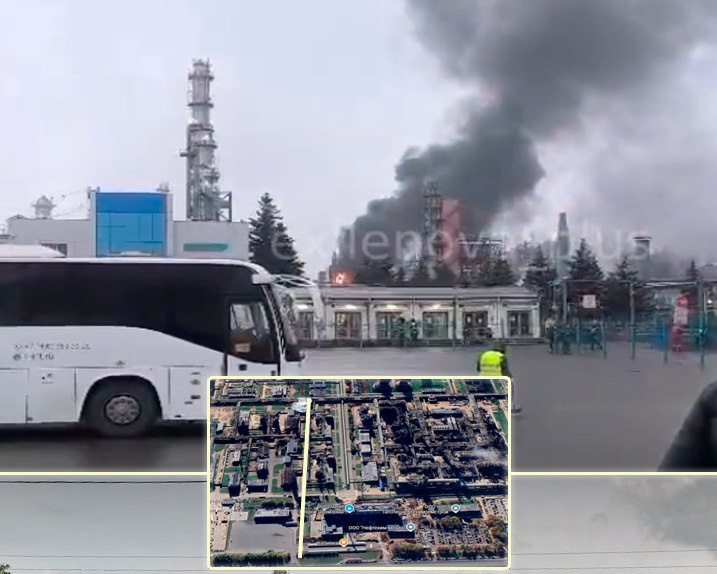

A major fire broke out today, 13 November, at one of the petrochemical plants in Nizhnekamsk, Tatarstan. According to preliminary reports, the blaze started in one of the production units of the “Nizhnekamskneftekhim” enterprise, which is among the key facilities in Russia’s petrochemical industry, Astra reports.
Photos shared on local social media show thick black smoke rising above the industrial area. No casualties have been reported to date, and the cause of the fire has not been officially determined.
The plant specializes in the construction, repair, and modernization of petrochemical and energy industry facilities, performing the full cycle of work, from manufacturing metal structures to installing technological equipment.
Experts note that such incidents reduce the production capacity of Russia’s petrochemical sector — one of the industries directly financing the war against Ukraine. Even if officially labeled as “fires,” the real economic damage to Russia could be significant.
A war that destroys not only Ukraine but Russia itself
Nizhnekamsk is located more than 1,000 kilometers from the Ukrainian border, but the war Russia is waging increasingly “comes back home,” damaging its economy, technological potential, and sense of security.


© Tyler Hicks/The New York Times
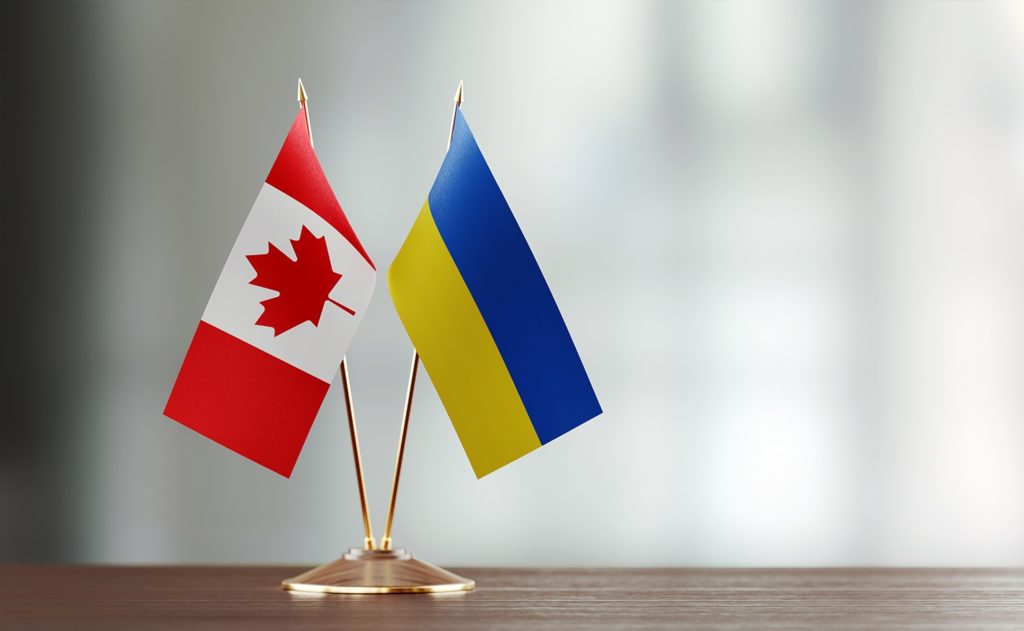

Canada has unveiled a new package of sanctions designed to strike at Russia’s energy revenues, military suppliers, and digital warfare infrastructure, according to the Canadian Government. The measures form part of a wider G7 strategy aimed at raising the economic cost of Russia’s invasion of Ukraine, now approaching its fourth year.
On 12 November 2025, Canadian Foreign Minister Anita Anand announced a sweeping expansion of sanctions under the Special Economic Measures (Russia) Regulations. The updated list targets 13 individuals and 11 entities, many of them directly involved in supplying or developing military and hybrid warfare tools used by Russia in its ongoing aggression against Ukraine.
Minister Anand said Canada remains “unwavering in its commitment” to Ukraine’s sovereignty and will continue to apply pressure until Russia halts its invasion. The announcement aligns closely with sanctions introduced in October by the United States, the European Union, and the United Kingdom.
The Canadian Government described the move as a direct response to Ukraine’s current priorities on the battlefield and as reinforcement of the G7’s coordinated pressure campaign. The update also signals Ottawa’s continued alignment with G7 member states on sanctions policy and military support.
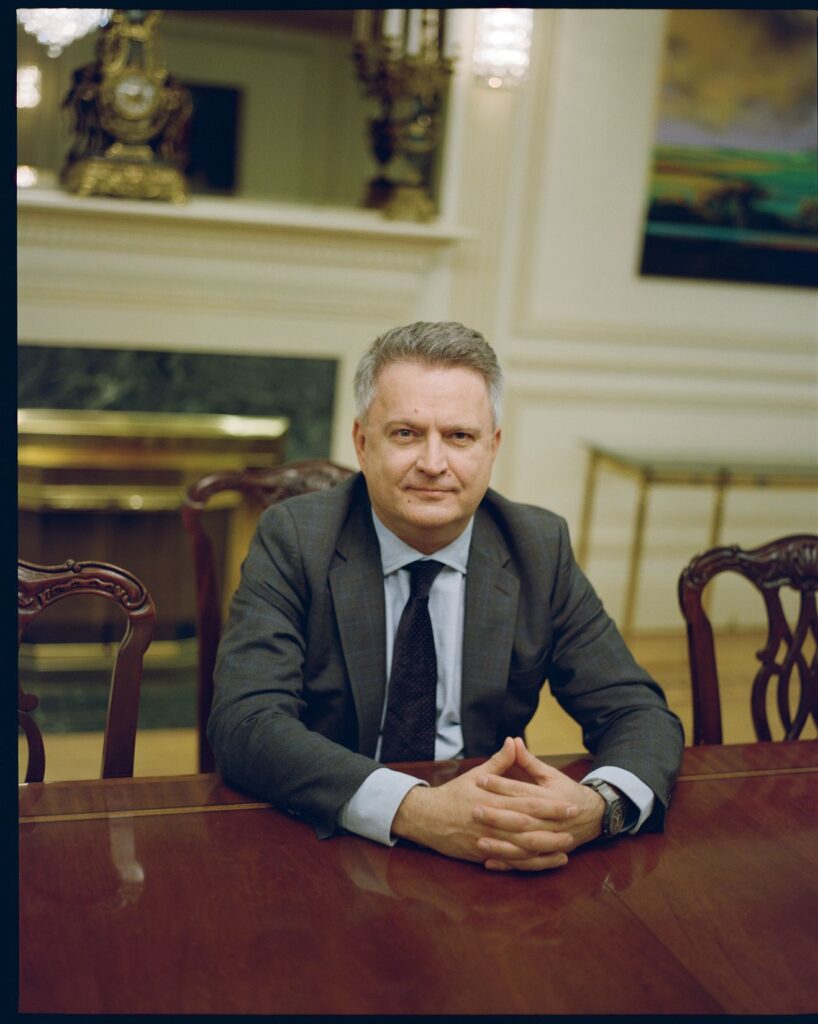

Russian negotiators came to peace talks in Istanbul with detailed dossiers on every member of Ukraine's delegation and proposed creating WhatsApp groups to simulate progress rather than discuss substantive peace terms, according to Ukraine's Deputy Foreign Minister Sergiy Kyslytsya.
In an interview with The Times, Kyslytsya described three rounds of negotiations held on 16 May, 2 June, and 23 July in the Turkish city, where Russia's lead negotiator Vladimir Medinsky opened discussions with a lecture denying Ukraine's separate identity.
"He had the entire line-up of Ukrainian defence ministers, generals and diplomats, and still they deny your identity, your nationality," Kyslytsya said.
The Ukrainian delegation had anticipated this approach and agreed beforehand to avoid engaging with historical arguments, he explained.
"They know very well the background of every one of us and sometimes they do say provocative things and quite nasty," the diplomat told The Times. The tactic was designed to distract Ukrainian negotiators and create grounds to blame them for derailing talks.
Medinsky concluded his opening remarks by stating "we, the Russians are killing Russians," Kyslytsya recalled. The Ukrainian team let Russian negotiators speak as long as they wanted before attempting to move to their agenda.
Russian representatives repeatedly refused to discuss concrete proposals, instead offering to establish working groups and messaging channels that could create an illusion of diplomatic momentum, according to Kyslytsya.
"You have to put your arguments on the desk too, then the other side also puts their arguments on the desk. Then you try to figure out, where is the common ground? What is a grey zone? Where is the batch of the arguments that are totally unacceptable? We never reached that point," he said.
The only ceasefire proposal Russia's delegation would consider was a two-hour truce to collect bodies from battlefields. All other discussions of temporary cessations of hostilities were rejected.
Kyslytsya explained that Russian negotiators operated under rigid mandates from the Kremlin. "In a dictatorship, you can't have creative discussions with negotiation teams representing the dictator. They come with a very rigid mandate and they have to defend whatever positions they were given," he said. "So in the Russian system, you have to deal directly with the dictator."
The deputy foreign minister, who was appointed by President Zelenskyy to oversee Ukraine's peace process with Russia and Western allies, said talks aimed to deceive American officials into believing negotiations were progressing to avoid punitive measures.
Before the Trump administration imposed sanctions on Russian oil companies Rosneft and Lukoil on 22 October, Kyiv worked to demonstrate Russian deception to Washington. Kyslytsya said he had confronted Trump's negotiator Steve Witkoff about accepting Kremlin rhetoric at face value.
"I told him at one of the meetings, you know, Mr Witkoff, your problem is that you are too American. Americans, overall are very direct, they hear what you say and they say what you want heard. While the eastern European and Byzantine attitude is very ornate and very difficult, full of hints and references," Kyslytsya recounted. "Witkoff was really buying at face value what the Russians were telling him."
Kyslytsya was in the room when Trump met with Zelenskyy a week before the sanctions announcement and had lobbied Treasury Secretary Scott Bessent on economic cooperation, including proposals to use Ukraine's underground gas storage network for American liquefied natural gas destined for Europe.
The Istanbul talks have since been abandoned. Kyslytsya said Ukraine's focus has shifted to pressuring international partners to force Putin into direct negotiations with Zelenskyy.


Kyiv strikes Russia’s military economy. On 12 November, Ukraine's General Staff reported that Kyiv troops targeted the infrastructure of Stavrolen LLC, a petrochemical enterprise, in Stavropol Krai, nearly 300 kilometers away from its border. The strike diminishes Russia’s ability to produce weapons used to kill Ukrainian civilians.
“The plant has a full cycle of hydrocarbon processing and produces polymers for manufacturing composite materials, body parts, seals, and insulation for various types of Russian military equipment. Among other things, it also produces components for UAVs,” the statement reads.
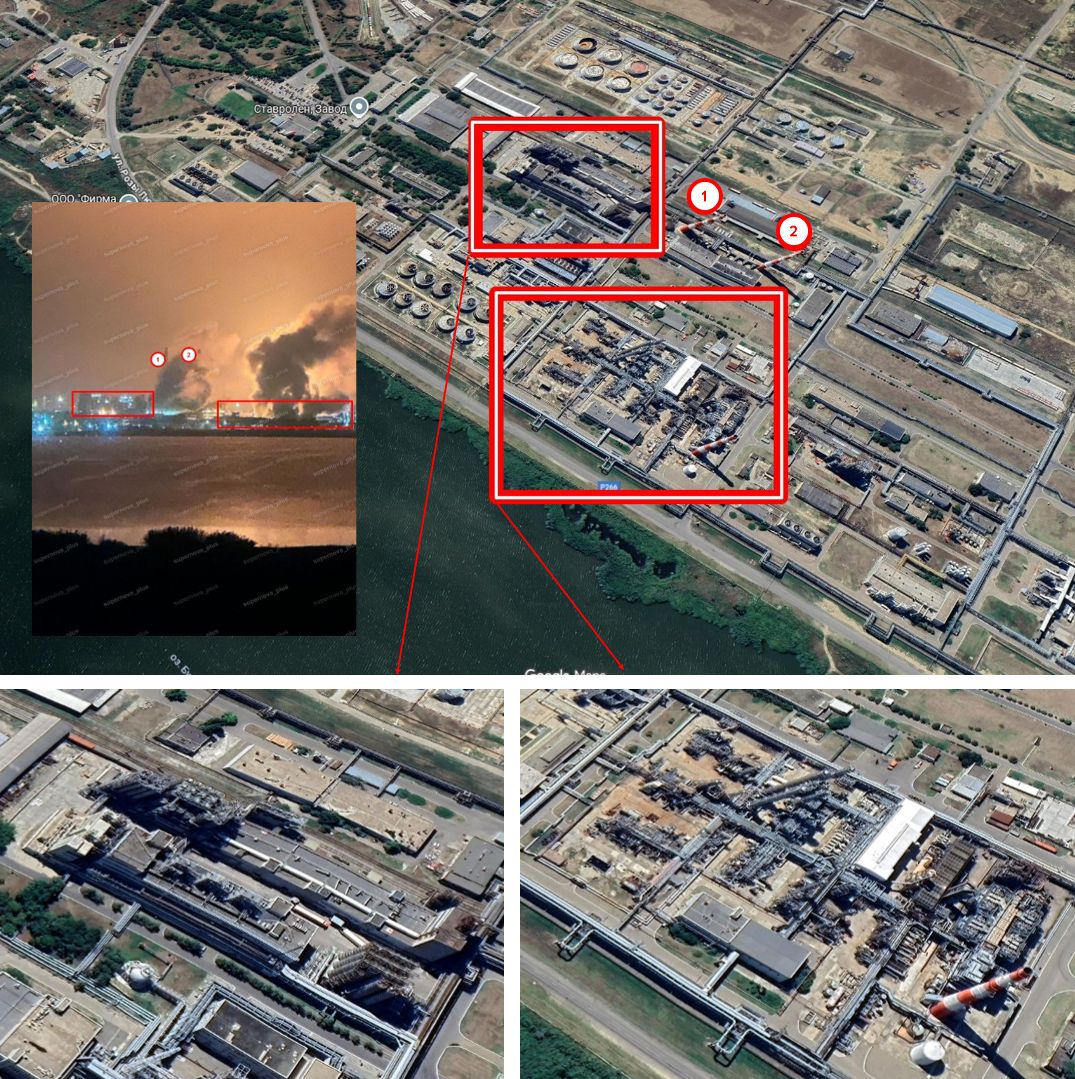
Multiple explosions and a large fire were recorded in the target area. The results of the strike are being clarified.
Additionally, to reduce the Russian offensive potential, an ammunition depot was struck in the temporarily occupied settlement of Novyi Svit, Donetsk Oblast.
“A direct hit and explosions were recorded. The extent of the damage is being clarified,” the General Staff said.
Ukraine's Special Operations Forces have also confirmed the strike.
“On the night of 12 November, Deep Strike units of the Special Operations Forces carried out a successful fire strike on the Stavrolen petrochemical plant in Budyonnovsk, Stavropol Krai, Russia," it reveals.
Several Ukrainian deep-strike drones reached their targets. Local residents confirmed the explosions on social media, while local authorities claimed the fire was caused by falling debris.


Russia's Federal Security Service has launched a sophisticated disinformation campaign alleging that Ukrainian and British intelligence services plotted to hijack a MiG-31 fighter jet equipped with Kinzhal hypersonic missiles and redirect it to NATO's Mihail Kogălniceanu airbase in Romania. The evidence-free accusation represents a dangerous escalation in Moscow's hybrid warfare targeting both Bucharest and Kyiv, arriving at a strategically opportune moment as Romania grapples with announced US troop reductions.
FSB and its hybrid "design"
The FSB's Tuesday announcement follows the established pattern of Russian intelligence services operating as primary tools in the information domain. The agency provided no evidence to support its claims, instead constructing an elaborate narrative involving $3 million bribes to pilots, British intelligence coordination, and even alleged involvement by the investigative journalism group Bellingcat.
Romania's Foreign Ministry swiftly dismissed the allegations with pointed irony.
"Soviet spy novels weren't exactly brilliant, being propaganda exercises. Today's Russian news stories with spies are the same," said Foreign Ministry spokesman Andrei Țărnea, emphasizing that "what's real is Russian aggression and the Russian provocations these stories about planes and spies attempt to cover."

Multi-Domain targeting strategy
The operation demonstrates textbook hybrid threat methodology across multiple domains:
Information domain: The primary vector employs disinformation to shape international perceptions and create confusion about alliance cohesion.
Diplomatic domain: By falsely implicating Romania in an alleged Ukrainian intelligence operation, Moscow seeks to create friction between NATO allies, particularly by exploiting sensitivities around Romania hosting alliance infrastructure.
Political domain: The timing capitalizes on genuine political tensions following the US troop withdrawal announcement, amplifying existing vulnerabilities in the Romanian security debate.
Military/Defense Domain: The narrative specifically targets Mihail Kogălniceanu airbase, NATO's largest military installation in southeastern Europe, where nearly 3,000 hectares are under development with €2.5 billion in investments planned through 2040.
Tool application: coordinated propaganda amplification
The operation's sophistication emerges in its cross-platform propagation. Chinese state media quickly amplified the FSB narrative, with Xinhua publishing a version that emphasized anti-Ukrainian angles and cited Russian State Duma deputy Dmitry Belik claiming the alleged plot demonstrated "Ukraine's intention to drag NATO into an open military conflict with Russia."
This coordinated echo represents a calculated information tool designed to establish false legitimacy through repetition across multiple authoritarian media ecosystems.
The narrative simultaneously serves Chinese strategic interests inportraying Western-aligned Ukraine as destabilizing.
Priming through provocation as the Hybrid playbook tool
The FSB operation aligns with the priming phase of hybrid threat activity, where actors establish narratives that can be leveraged during future destabilisation or escalation phases.
By creating a fictional "precedent" of Ukrainian-British operations against Russian assets via Romanian territory, Moscow establishes information terrain for potential future false-flag operations or diplomatic pressure campaigns.
Notably, the FSB claimed that in response to this "thwarted plot," Russian Aerospace Forces struck Ukrainian intelligence facilities in Brovary and Starokonstantinov airfield on November 9-10 using Kinzhal missiles. This represents a dangerous inversion of cause and effect, potentially providing retroactive justification for kinetic military operations.
Strategic Objectives: fracturing alliance cohesion
The underlying objectives align with Russia's documented strategic culture of exploiting openness in democratic societies while seeking to undermine collective security architectures:
Resilience Response: exposure and Attribution
Romania's response demonstrates effective hybrid threat countermeasures. By immediately exposing the disinformation, using accessible language that frames the narrative within historical Soviet propaganda patterns, and refusing to legitimize the accusations through detailed rebuttals, Romanian officials denied the operation its intended amplification effect.
The incident highlights the importance of rapid response capabilities, strong inter-agency coordination between foreign ministries and defence establishments, and effective public communication strategies that expose hybrid operations without inadvertently reinforcing their narratives.
Vulnerability exploitation in transitional security contexts
The operation's timing reveals sophisticated intelligence about alliance vulnerabilities.
By launching this disinformation campaign during a genuine period of Romanian concern about US force posture adjustments, the FSB maximized the narrative's potential to create doubt and friction.
Approximately 5,000 NATO troops currently stationed in Romania, predominantly from the United States, Poland, France, and Spain, represent a tangible alliance commitment that Russia seeks to undermine.

Implications for Hybrid Threat Preparedness
This incident validates several core principles of the hybrid threats analytical framework:
As hybrid warfare continues evolving, the Mihail Kogălniceanu fabrication serves as a case study in how authoritarian actors weaponize information during periods of genuine security transition, seeking to transform legitimate policy debates into tools of strategic destabilization.
This analysis employs the Hybrid CoE conceptual framework for analyzing hybrid threats across actors, tools, domains, and phases to provide structured understanding of contemporary information warfare operations.


Mykola Sedykh and Stas Balytskyi were eight years old when Russian occupation began in Donetsk Oblast. Now, they wear Russian military uniforms after years in cadet schools—victims of war crimes who may return to Ukraine as occupiers.
Ukraine faces a generation gap Russia engineered through decade-long indoctrination campaigns. Since 2014, Moscow has deported children from Donetsk Oblast orphanages and shelters, subjected them to years of pro-Russian propaganda in cadet schools, and channeled them into military service once they reach conscription age, according to an investigation by Ukrainian online newspaper Texty. The two young men now of legal age—Mykola Sedykh and Stas Balytskyi—exemplify how children removed from Ukrainian institutions become part of Russia's occupation forces, potentially returning to fight against their homeland.

Eight-year-old Mykola Sedykh spent four years in a Khartyzsk shelter between 2015 and 2019, where Russian paramilitaries from the "Pyatnashka" brigade regularly visited, bringing gifts and displaying weapons, Texty found. For children without parental protection, these armed men became heroes rather than invaders. The International Committee of the Red Cross recently clarified that propaganda aimed at encouraging children from occupied territories to voluntarily join enemy military service constitutes a war crime, even when presented as voluntary recruitment.
Stas Balytskyi's trajectory followed similar patterns. After losing both parents during the war, Russian propaganda outlets exploited his image for "Save Donbas Children" campaigns targeting European audiences, using orphaned children to justify Moscow's 2014 invasion while simultaneously preparing those same children for future combat roles.

Both boys ended up at Donetsk Boarding School No. 1, which deported 225 children to Russia on 18 February 2022, six days before the full-scale invasion. Director Olha Volkova, decorated with medals by occupation authorities, oversaw militarization programs including Yunarmia youth army participation before.
The institution has since transformed into a militarized cadet school named after Russian cosmonaut Georgiy Beregovoy, enrolling approximately 180 Ukrainian children starting from first grade, with a Russian citizen and war participant serving as military director.
Sedykh and Balytskyi were separated into different Cossack cadet schools—Sedykh to Kropotkin in Krasnodar Krai, Balytskyi to Ruza in Moscow Oblast, Texty reported. These facilities function as military boarding schools with weapons training, parade drills, and mandatory meetings with war veterans. Sedykh's school honors Russian General Gennadiy Troshev, who advocated public executions of Chechen resistance fighters during the 1990s conflicts.
Recent photos show both young men in Russian military uniforms. Balytskyi now attends Moscow Higher Military Command School training motorized rifle commanders and military police, while Sedykh appears to have joined a Kuban Cossack military formation, likely one of the BARS units currently fighting in Zaporizhzhia, Kherson, and Donetsk oblasts.
Russia's Kuban Cossack forces deployed more than 9,200 personnel in Ukraine as of 2025. Ukrainian citizen Mykola Sedykh may soon return to Donbas—but as Nikolay (the Russian version of his name), an occupation soldier potentially fighting against his own country.
The International Criminal Court issued arrest warrants for Vladimir Putin and Maria Lvova-Belova in March 2023 for illegal child deportation. Ukraine searches for nearly 20,000 deported children, though Russia's children's rights commissioner claimed receiving over 700,000 Ukrainian minors.


A major inland Chinese refiner, Yanchang Petroleum, is seeking non-Russian oil as another state-run plant, Luoyang Petrochemical, closes its two crude distillation units following US sanctions, Reuters reports.
Chinese refiner Yanchang Petroleum is now seeking crude supplies that do not originate from Russia, traders told Reuters. The company, backed by the Shaanxi provincial government and located in northern inland China, has launched a tender to secure non-Russian oil for delivery between December and mid-February.
Yanchang, which holds an annual import quota of 3.6 million metric tons or 26 million barrels, typically receives crude via rail from Tianjin port near Beijing. Until now, it had regularly bought Russian oil, with one trader noting the refiner used to import around one shipment per month, typically Far East export grades like ESPO blend or Sokol, Reuters reported.
Its decision to avoid Russian supplies marks a significant shift. China and India are the top buyers of Russian oil, but recent sanctions by the US and other Western countries have raised fears among buyers of falling afoul of secondary penalties. Yanchang has not responded to Reuters’ request for comment.
At the same time, a separate Chinese state-owned refinery has suspended operations due to disruptions linked to those same sanctions. Reuters reports that Luoyang Petrochemical, a subsidiary of the Chinese state refining giant Sinopec, has shut down both of its crude distillation units for maintenance.
The halt comes after US authorities sanctioned a key oil terminal in eastern China in early October. That terminal handles roughly one-fifth of Sinopec’s crude imports. The action forced significant diversions in crude shipments and affected operations at connected plants supplied by pipeline, including Luoyang.
Three sources familiar with the situation told Reuters that Luoyang’s crude units, with a combined processing capacity of 200,000 barrels per day, have been offline since late October. The shutdown is expected to last through the end of November.
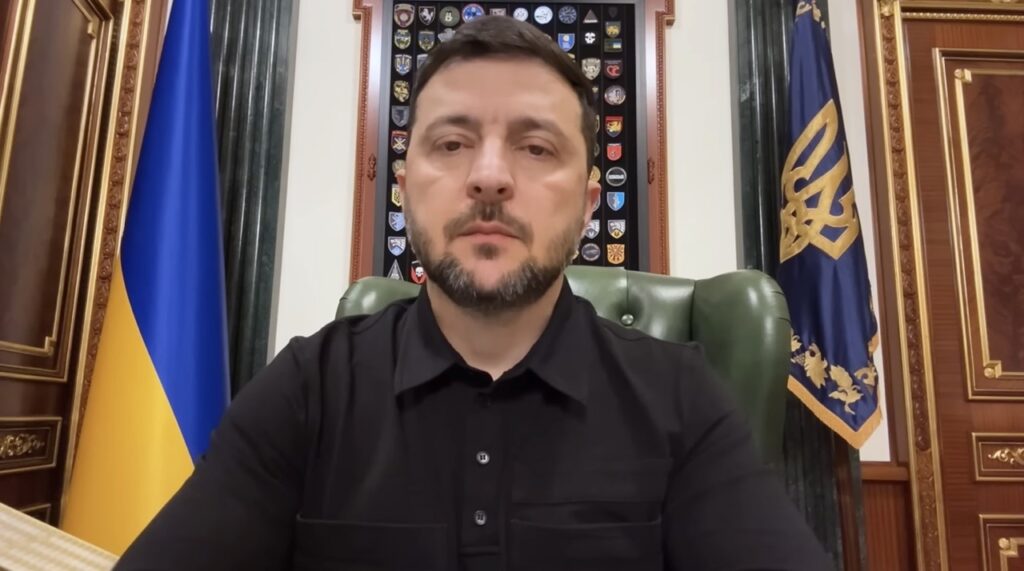

Ukrainian President Volodymyr Zelenskyy announced on 9 November that Ukraine and EU partners are preparing the 20th sanctions package against Russia, expected within a month, as Moscow's oil revenues collapsed 27% year-on-year in October amid existing restrictions and falling crude prices.
The timing connects Ukraine's push for expanded sanctions with mounting evidence that economic pressure is beginning to crack Russia's war financing. Russia collected 888.6 billion rubles ($9.7 billion) in oil and gas taxes in October, down from the same month last year, according to Russia's Finance Ministry.
Zelenskyy outlined specific targets for the 20th package in his evening address:
"Every Russian missile and every Russian drone contains specific components from other countries, specific countries – without them, there would simply be no Russian weapons," Zelenskyy said, directing Ukraine's Foreign Ministry to intensify work on cutting these supply lines.
The revenue collapse suggests sanctions are gaining traction. Russia's oil and gas revenues totaled 7.5 trillion rubles over the first 10 months of 2025, down 2 trillion from 9.54 trillion a year earlier. The decline accelerated from 14% in the first five months to 21% by October.
Multiple factors drove the drop: Russia's Urals crude averaged just $53.99 per barrel in October, below the government's $70 initial forecast and even its revised $56 target. Meanwhile, late October saw the US sanction Rosneft and Lukoil, Russia's two largest oil companies accounting for half of Russian crude exports—about 2.2 million barrels daily.
Around 70% of Russia's seaborne oil exports now face US restrictions. Analyst Vladimir Chernov of Freedom Finance Global estimates a 5-10% drop in Rosneft and Lukoil exports combined with wider discounts could cost Russia's state budget up to 120 billion rubles ($1.3 billion) monthly.
Russia's Finance Ministry expects a 22% shortfall in hydrocarbon revenues for 2025, projecting just 8.6 trillion rubles against an initial 10.94 trillion target. The ministry sees no significant recovery through 2028, with oil and gas revenues projected at 8.9 trillion in 2026, 9 trillion in 2027, and 9.7 trillion in 2028—still 20%, 19%, and 13% below 2024 levels respectively.
To plug widening fiscal gaps expected to reach 5.7 trillion rubles this year and exceed 10 trillion over the next three years, Moscow plans sharp tax increases. Value-added tax rises to 22% starting next year, small business taxes jump significantly, and the Finance Ministry aims to raise 12 trillion rubles through new borrowing.
Ukraine also introduced new sanctions Saturday targeting Russian government officials, occupation administrators, propagandists, collaborators, and military-industrial complex workers. "Russia continues its war, and in response, there must be our strong pressure with partners – pressure that is truly tangible for Russia, that brings them losses and that is felt politically," Zelenskyy said.
The president emphasized that all Russian attempts to disrupt processes with the United States and Europe would receive sanctions responses, declaring: "Everything gets its own reaction, its own sanctions."
Read also:


Russia is fighting in Ukraine thanks to secret international logistics. North Korea arms Russia and receives classified technologies in return. According to analysis, about 70% of the ammunition used by Russia in the war against Ukraine is manufactured in North Korea, Japanese outlet Kyodo News reports.
Since the start of the all-out war in 2022, Pyongyang has supplied Moscow with about 6.5 million munitions in exchange for Russian military technologies to produce its own weapons.
The documents received by the journalists also indicate the transfer of air defense technologies, space developments, and $20 billion in aid, including nuclear technologies, to North Korea.
The documents show that approximately 90% of electronic components for Russia's defense, including semiconductors, originate from China.
In return, Moscow supplies China with energy resources, rare metals, and dual-use goods for both civilian and military purposes, including components for aircraft and submarine production.
Additionally, Iran has provided Russia with about 2,200 drones and technologies for producing explosives. In exchange, Tehran received air defense systems and radars from Moscow, deepening military cooperation in the region.
Ukrainian defense experts emphasize that the logistics network from North Korea, China, and Iran supports Russia’s war, highlighting the need to isolate Moscow through Western sanctions.
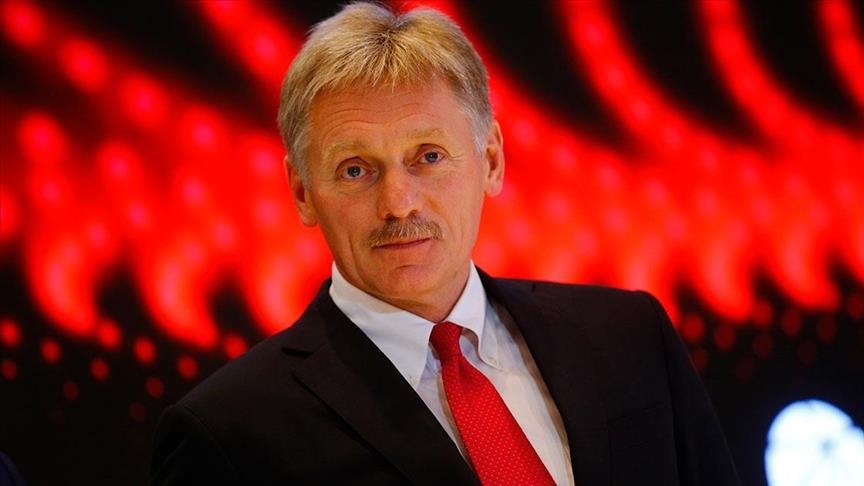

Russia does not plan to stop killing Ukrainians. Kremlin spokesperson Dmitry Peskov has stated that the war against Ukraine will only end “when Russia achieves the goals it has set," UNIAN reports, citing Russian sources.
Moscow does not want part of Ukrainian territory or money; it wants Ukraine to cease to exist. This is the most common mistake the West makes in understanding the reasons behind Russia's genocidal war.
Previously, US President Donald Trump proposed various options for Russia, such as conducting joint business, inviting President Vladimir Putin to Alaska, and hinting that Ukraine could potentially give up Crimea. However, none of this led to success. As a result, the US administration imposed sanctions on Russia and declined a meeting in Budapest.
“I would like this conflict to end as soon as possible. It can only end when Russia achieves the objectives it initially set,” Peskov said.
The Kremlin's spokesperson claimed that Moscow supposedly wants the war to end through political and diplomatic means. He also shifted the blame for the stalled negotiations once again onto other countries.
He claimed that the Russian side remains open to such a path, but the situation is currently on hold, not because of Russia.
“Our interlocutors do not wish to continue the conversation; they are being actively encouraged by Europeans, who believe that Ukraine can win the war and secure its interests by military means,” Peskov added.
Since 2022, Russia has demanded Ukraine's de facto capitulation, calling for its disarmament and the reduction of its military to leave it vulnerable to future invasions.
In August 2025, Putin confirmed that Russia’s conditions for ending the war, announced back in the summer of 2024, remain unchanged.
Last year, he insisted on the withdrawal of Ukrainian troops from the occupied territories of Donetsk, Luhansk, Kherson, and Zaporizhzhia. Moscow has illegally incorporated these Ukrainian regions into its Constitution. Additionally, Russia demands that Ukraine renounce NATO membership, enshrine a non-nuclear status, and lift sanctions.


Yurii Fedorenko, commander of Ukraine’s 429th separate unmanned systems regiment “Achilles,” said Russia’s Rubicon center for unmanned systems can quickly scale from a company to a battalion thanks to manpower and financial resources Ukraine cannot match. He spoke to LIGA.net about the growing challenge.
Drone warfare has become one of the defining features of the war, with Russia investing heavily in organised, well-funded units that can quickly expand and adapt on the battlefield. These efforts have turned unmanned systems into a key part of Moscow’s military strategy, giving it an advantage in scale and coordination that Ukraine often struggles to match.
Fedorenko described Rubicon as a direct response to Ukraine’s “Line of Drones” - a nationwide project that coordinates Ukrainian drone units for reconnaissance, targeting, and operational support on the frontlines - with Moscow standardizing training, tasking, and logistics across its units.
The structure allows Russia to rapidly expand personnel, provide the best equipment, and focus on narrow operational functions, unlike infantry or assault units that spread resources across multiple tasks.
He noted that Russia recruits heavily through incentives and youth program linked to United Russia - Russia’s ruling political party - training thousands of 16-17-year-olds as future drone pilots who will be mobilized at 18.
Fedorenko emphasized that Rubicon units have priority in receiving resources, including advanced technology and funding for research, development, and innovation centers.
According to Fedorenko, Ukraine cannot match these scales of expansion and funding, relying instead on teaching, equipping, and persuading volunteers to join, a slower and more resource-constrained process.
Follow Euromaidan Press on Google News! YOUR SUPPORT = OUR VOICE

© Sarah Pabst for The New York Times


© Tierney L. Cross/The New York Times


Hungary became the first NATO ally to secure exemption from US sanctions on Russian energy when President Donald Trump granted Prime Minister Viktor Orban a one-year waiver during their 7 November White House meeting, a White House official confirmed to Reuters.
The exemption allows Hungary to continue purchasing Russian oil and gas in exchange for over $1.4 billion in Hungarian commitments to US nuclear, defense, and energy purchases. The move marks a significant breach in Western sanctions against Russia, as Orban—who has vowed to veto Ukraine's EU accession and opposes its NATO membership—openly aligned with Trump in characterizing the war as unwinnable and positioning both leaders as the sole "pro-peace" voices in the West.
This development threatens Ukraine's strategic position because it weakens the coordinated sanctions regime designed to constrain Russian energy revenues that fund Moscow's war effort, while emboldening an EU and NATO member to maintain financial flows to Russia and block Ukrainian integration into Western security structures.
Trump welcomed Orban for a bilateral meeting and lunch that yielded immediate economic and diplomatic results.
Politico reported that Hungary signed a memorandum of understanding on civil nuclear cooperation valued at $20 billion, including construction of 10 small modular reactors in Budapest using US nuclear technology. Hungary also committed to purchasing $114 million in nuclear fuel from US-based Westinghouse, $600 million in liquified natural gas, and $700 million in defense materials.
The centerpiece of Orban's visit was securing relief from US sanctions targeting Russian energy. According to Reuters, a White House official confirmed Hungary received a one-year exemption from sanctions on Russian oil and gas. Trump justified the decision by citing Hungary's landlocked geography, stating "it's very difficult for him to get the oil and gas from other areas" and noting that Hungary lacks seaports for alternative energy imports.
The exemption contradicts Trump's previous pressure on European nations to cut Russian energy purchases to economically isolate Moscow.
BBC analysis noted that Hungary and Slovakia together have paid Russia $13 billion for oil between Russia's February 2022 invasion and the end of 2024, providing critical hard currency to Moscow despite Western sanctions efforts.
The sanctions exemption directly undermines Ukraine's defensive capabilities by preserving Russian energy revenues that finance military operations. Russian oil and gas sales remain Moscow's primary source of hard currency for weapons procurement, troop salaries, and military industrial production—the economic foundation sustaining Russia's invasion.
More strategically, the exemption creates the first formal crack in the unified Western sanctions architecture. If a NATO and EU member can obtain preferential treatment on Russian energy, other nations may seek similar exemptions, accelerating the collapse of coordinated economic pressure that has been one of the West's primary non-military tools against Russian aggression.
The exemption also rewards Orban's obstructionism toward Ukraine within European institutions. Politico reported that Orban has declared he would veto Ukraine's accession to the European Union and opposes Ukrainian NATO membership—positions that directly contradict the policies of most NATO allies and EU members who view Ukrainian integration as essential to long-term European security.
During the White House meeting, Orban openly expressed skepticism about Ukraine's ability to prevail militarily against Russia. When Trump asked whether Orban believed Ukraine could win the war, Orban responded evasively: "Miracle[s] can happen," according to Politico. This framing aligns with Trump's characterization of the war as unwinnable through military means and contradicts the position of NATO leadership and most European governments that sustained military aid is essential to Ukrainian defense.
Orban described the US and Hungary as the only "pro-peace" governments addressing the Russia-Ukraine war, and characterized other European nations as "misunderstanding" the conflict by believing Ukraine can prevail on the battlefield, according to the Politico report. This rhetorical positioning isolates Ukraine diplomatically by suggesting that support for Ukrainian military resistance represents a misguided approach rather than legitimate defense of sovereignty.
Trump also revived plans to host a peace summit in Budapest with Russian President Vladimir Putin to discuss Ukraine. Last month, Orban was reportedly offered the opportunity to host such a summit, though that plan "quickly disintegrated," Politico reported. During the 7 November meeting, Trump stated: "If we have it, I'd like to do it in Budapest"—suggesting Hungary could serve as the venue for negotiations that would likely marginalize Ukrainian input and European perspectives on territorial integrity and security guarantees.
The economic package Hungary committed to represents a significant financial outlay designed to demonstrate reciprocity with the Trump administration. The BBC reported that the nuclear agreement includes construction of 10 small modular reactors valued between $10 billion and $20 billion, which Hungary needs to power expanding Chinese battery manufacturing plants around the country. These smaller nuclear facilities face fewer construction delays and licensing complications than traditional large-scale plants.
Hungary also agreed to purchase $114 million in nuclear fuel from US-based Westinghouse for its Paks 1 nuclear power station, which was built by the Soviet Union in the 1980s and currently supplies approximately 40% of Hungary's electricity needs, according to the BBC. The US agreement to lift nuclear sanctions on Hungary may help restart the long-delayed Paks 2 expansion project, which has been financed and designed by Russia's Rosatom but faces persistent technical and licensing obstacles.
Orban framed the visit as the beginning of "phase two" in Hungary's improving relationship with the Trump administration, referencing what he characterized as "politically motivated sanctions" from the Biden administration against his top aide, Antal Rogan, who was sanctioned for corruption allegations, Politico reported.
The meeting creates several concerning scenarios for Ukraine and the broader Western alliance. If Trump's precedent encourages other nations—particularly those with less stable democratic institutions or closer ties to Russia—to request similar exemptions, the coordinated sanctions regime could fragment rapidly. The divergence between Hungary's position and that of other NATO and EU members will deepen existing tensions within both institutions, undermining the unified deterrence posture that underpins Ukrainian security.
The exemption complicates Congressional support for Ukraine. Congress controls military aid to Kyiv and now faces questions about backing a country while its NATO ally undermines sanctions on Russia's main revenue source. Trump's willingness to host peace talks in Budapest, paired with Orban's skepticism about Ukrainian victory, signals negotiations could pressure Ukraine into territorial concessions and forced neutrality.
The BBC noted that critics argue energy dependence on Russia is merely being replaced by energy dependence on the US, while the Orban government contends it is achieving greater diversity of supply. However, the one-year timeframe for the exemption—expiring just after Hungary's April 2026 election—suggests the waiver is designed primarily to boost Orban's domestic political position rather than address structural energy security concerns.


© Tierney L. Cross/The New York Times


Over 20,000 customers in Belgorod and the surrounding oblast lost electricity on the evening of 8 November, following reports of missile danger, according to Russian governor Vyacheslav Gladkov.
The Belgorod Oblast declared a missile alert at approximately 6:10 pm, which was lifted at 6:23 pm. Gladkov claimed air defense systems were activated over the region and that "targets were shot down," with no reported casualties.
In Belgorod itself, several garages caught fire, Gladkov said. Power outages affected multiple streets in the city. The village of Dubove in Belgorod district was also partially left without electricity.
"Emergency services are working on site to restore power supply," the governor said.
The Telegram channel ASTRA reports that the "Luch" thermal power plant in Belgorod likely came under attack.
Earlier on 8 November, Russian authorities reported a strike on energy infrastructure in Volgograd Oblast, which left four districts without power.
Meanwhile, Kyiv has been experiencing its own power outages, with the Ukrainian capital facing electricity supply disruptions.


© Gleb Garanich/Reuters
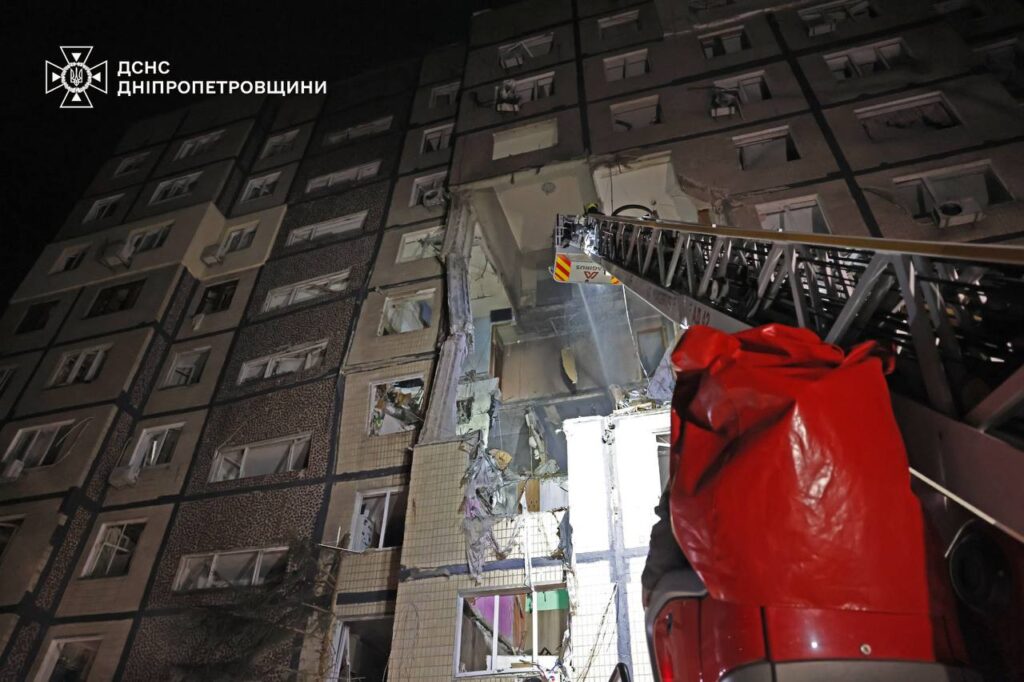

Ukraine is paying a terrible price for its resistance to Russia's genocide war and occupation. On the night of 8 November, all of Ukraine came under fire. The Russian army launched over 450 attack drones and 45 missiles, targeting residential buildings and energy infrastructure across the country.
According to Centrenergo, a company supplying electricity to central and eastern Ukraine, its three thermal power plants have been forced to shut down following the attacks. Eight regions are facing widespread power outages, and in Kyiv, residents are left without electricity for up to 12 hours a day.
In Dnipro, a drone strike on a residential building killed three people.
President Volodymyr Zelenskyy said the attacks must trigger a unified global sanctions response.
“Every strike by Moscow on our energy sector must be met with sanctions on the entire Russian energy sector, without exception. Nuclear energy, the military-industrial complex, and trade in oil and gas must all be under sanctions," Zelenskyy claimed.
He emphasized that the world must act on frozen Russian assets and increase support for Ukraine to prevent the Kremlin from destroying the country’s civilian energy system before winter.
According to Air Force spokesperson Yurii Ihnat, Russia used a record number of ballistic missiles in this latest strike, per 24 Channel.
“Twenty-five Iskander-M/KN-23s and seven Kinzhal missiles. A total of 32 missiles followed ballistic trajectories. This is Russia's new tactic," he said.
The main strikes hit the regions of Kharkiv, Kyiv, Poltava, Dnipro, Kirovohrad, Mykolaiv, Sumy, Chernihiv, and Odesa.
Ukrainian rescuers carried a girl out of damaged building in Dnipro after Russian drone crashed directly into it
— Euromaidan Press (@EuromaidanPress) November 8, 2025
Three people were killed, while others were thrown from their beds and pinned under window frames by blast wave. Russia ruined 111 apartmentsSuspilne Dnipro pic.twitter.com/RjAZfAi8Se
Naftogaz CEO Serhii Koretskyi said the 8 November strike was the ninth deliberate attack on civilian gas infrastructure since early October.
“This is yet another act of terrorism aimed at depriving Ukrainians of gas, heat, and electricity during the winter," said the head of the the largest national oil and gas company of Ukraine.
On the eve of the strikes, Ukraine signed an agreement to import US liquefied natural gas (LNG) via Greek terminals. According to the Ministry of Energy, the deal represents a long-term partnership through 2050, ensuring stable gas supplies and integrating Ukraine into European energy routes.
“We are building a resilient system for the delivery and storage of American gas to prevent Moscow’s energy blackmail,” said Energy Minister Svitlana Hrynchuk.
The Kremlin is now operating even more clinically and cynically than before. Russian capabilities and tactics are evolving faster than Ukraine can improve its air defenses, both missile interceptions and electronic warfare measures around sensitive sites. It appears this winter will be a test of endurance like no other.
The Kremlin has changed the way it is terrorizing Ukrainians when temperatures are going low, by concentrating on specific regions, striking in waves, and using new variants of cheap Shahed drones.
The drones are also attacking differently, approaching from near‑vertical trajectories and flying above the effective range of machine guns, almost like missiles.
Beyond the cost of damaged infrastructure, recent attacks are forcing Ukraine to spend a staggering $1.9 billion on imported gas.
Experts warn that this winter could be one of the toughest in Ukraine’s history. The world’s response will determine whether the aggressor can be contained or whether the global community allows the destruction of sovereign nations by force.
Follow Euromaidan Press on Google News! YOUR SUPPORT = OUR VOICE

© Doug Mills/The New York Times


© Doug Mills/The New York Times
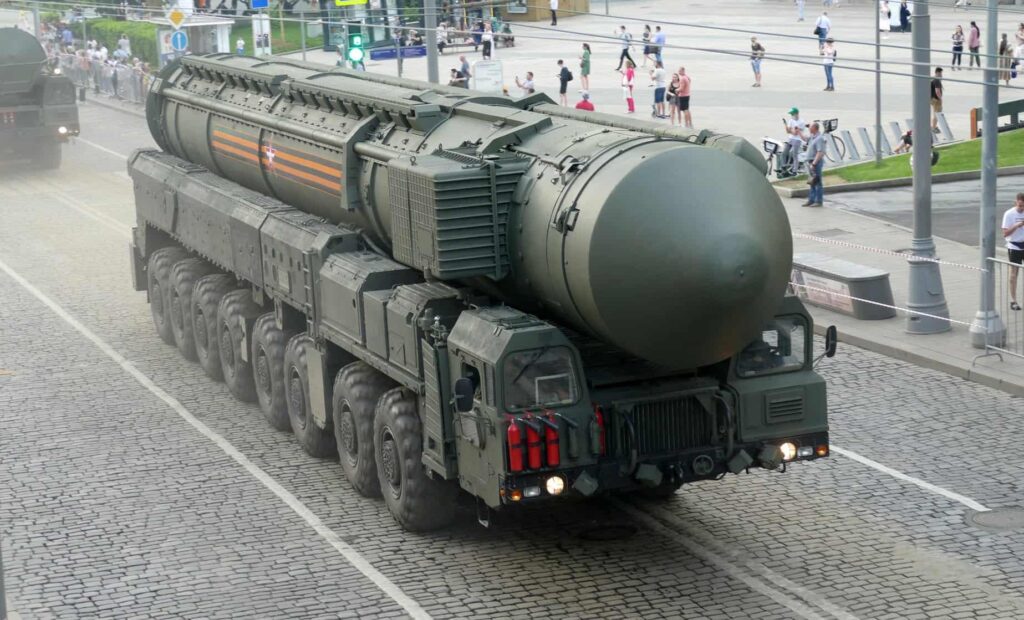

The era of nuclear arms reduction is officially over. The world is returning to a trend of expanding nuclear arsenals, intensifying nuclear rhetoric, and abandoning arms control agreements, says Hans Kristensen, Associate Senior Researcher at the Stockholm International Peace Research Institute’s (SIPRI) Weapons of Mass Destruction Program, per Newsweek.
According to Kristensen, the world is witnessing the growth of nuclear stockpiles, the escalation of rhetoric, and the rejection of arms control.
In recent weeks, the US has conducted a test launch of a Minuteman III intercontinental ballistic missile, without a warhead, but with a clear political message.
The test was a response to recent Russian military drills, which took place after the collapse of the planned US President Donald Trump– Russian President Vladimir Putin meeting in Budapest regarding the war in Ukraine. Russia has not demonstrated readiness to make concessions or even discuss compromise conditions to end hostilities.
The US military said the purpose of the launch was to evaluate the reliability, readiness, and accuracy of the weapon system.
Before the American Minuteman III was launched, Russia launched a Yars intercontinental ballistic missile from the Plesetsk Cosmodrome, which hit its target at the Kura range in Kamchatka.
The Kremlin stated that the exercise aimed to test the readiness of its military command structures. Putin personally observed the process.
Following the tests, Trump stated that he could work on denuclearization with Russia and China, but acknowledged that both countries could catch up to the US within four to five years.
All three nuclear powers — China, the United States, and Russia — now possess a complete nuclear triad: intercontinental missiles, ballistic missile submarines, and nuclear-capable aircraft. This ensures that each has the ability to deliver a retaliatory strike, even after sustaining an initial attack.
It remains unclear whether Beijing or Moscow will respond with new tests. One thing is clear: the world has entered a phase of dangerous nuclear modernization.


© Doug Mills/The New York Times


© Laetitia Vancon for The New York Times


© Sergey Ponomarev for The New York Times


Seventeen South African men are stranded in the Donbas region of eastern Ukraine after being misled into joining mercenary forces, according to the country's official statement. President Cyril Ramaphosa has ordered an investigation into how the group was recruited under false pretenses and drawn into “seemingly mercenary activities” in the war zone. In August, South African authorities warned young citizens to be cautious about job offers in Russia that were circulating on social media.
South Africa continues to present itself as non-aligned in the war, maintaining ties with both Kyiv and Moscow. Ramaphosa has met with leaders from both countries. However, the country has close relationships with Russia through the BRICS alliance.
South Africa’s presidency said in a statement that all 17 men, aged between 20 and 39, were "lured to join mercenary forces involved in the Ukraine-Russia war under the pretext of lucrative employment contracts." The men are currently "trapped in the war-torn Donbas" in eastern Ukraine.
The statement said the South African government is now working to repatriate them.
“President Cyril Ramaphosa has ordered an investigation into the circumstances that led to the recruitment of these young men into these seemingly mercenary activities,” the presidency said.
It did not state which side the men were fighting for. Reuters says Ramaphosa's spokesperson added,
“We don't know yet, hence the investigation.”
Ostensibly without knowing whether they were fighting for Moscow or Kyiv, Pretoria is “working through diplomatic channels to secure the return of these young men following their calls for assistance to return home,” the statement reads.
Under South African law, it is illegal for citizens to participate in foreign armies or provide military assistance to foreign governments without authorization. The investigation aims to determine how these men ended up violating those provisions and whether criminal recruitment networks were involved.
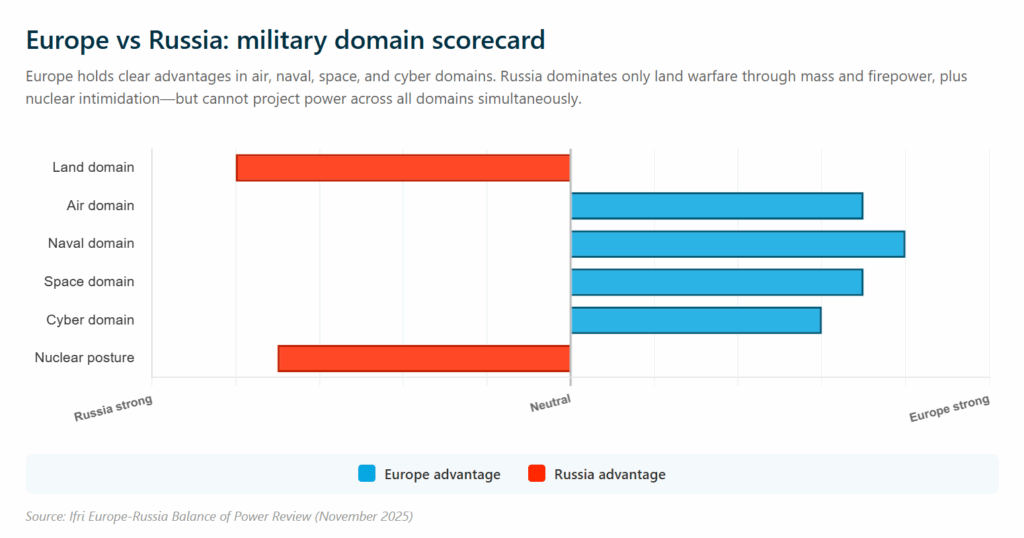

“Iranization” describes a country that is stuck with limited modernization, long-term stagnation, and a deepening dependence on China. It’s the first major Western institutional attempt to define Russia’s trajectory as structurally comparable to Iran’s decades-long isolation.
The deterioration is accelerating faster than mid-year projections suggested.
Russia’s reserves are depleting and deficits mounting through October. Moscow retains the capacity to sustain its invasion through 2026, but the economic model is collapsing into stagflation.
The French Institute of International Relations (IFRI) report, “Europe-Russia: Balance of Power Review,” supervised by nine European think tank directors, defines the term precisely.
Russia’s modernization potential is curtailed, growth will slow severely, and dependence on China will deepen.
Like Iran after decades of sanctions, Russia faces structural isolation from Western markets, financial systems, and technology transfers.
IFRI’s mid-year assessment saw trouble coming. Russia’s economic momentum had peaked by year-end 2024 and was drifting into stagflation. The warning signs included rising inflation, a projected budget deficit of 2.6% in 2025, and the National Wealth Fund’s liquid portion shrinking to $31.5 billion by June 2025.
Four months later, the trajectory is accelerating.
Russia’s budget deficit hit 4.2 trillion rubles ($48.2 billion) in the first eight months of 2025—four times higher than the previous year, per Russian Finance Ministry data. The National Wealth Fund now stands at roughly $40 billion, continuing its decline despite a modest uptick from June.
Russia entered stagflation exactly when IFRI predicted, with deterioration accelerating through autumn.
Russia’s isolation shows most starkly in the energy. IFRI calculates Russia’s gas sector won’t recover from losing the European market—€160 ($185) billion in lost Gazprom export revenue over 2025-2030.
This isn’t cyclical disruption. It’s irreversible structural damage.
Yet, as IFRI points out, Europe absorbed the shock. Fossil-fuel import bills halved compared to 2022 levels—over €250 ($288) billion in annual savings for European countries.
The IFRI report notes Europe has implemented an unprecedented industrial policy shift, strengthening resilience and competitiveness while positioning itself to become the world’s most electrified economy and global climate leader by 2030.
The critical caveat: Russia’s ability to sustain the war effort isn’t exhausted, particularly if oil prices remain stable. Lower oil prices or additional strict sanctions would create precarious conditions, but Moscow retains operational capacity for now.
The IFRI assessment notes that while Russia retains war-fighting capacity, Europe holds clear advantages in air, naval, space, and cyber domains. Russia dominates only land warfare through mass and firepower, plus nuclear intimidation, but cannot project power across all domains at once. Outside Ukraine’s ground war, the military balance remains decisively in Europe’s favor.
The significance of “Iranization” as terminology? It reveals a shift in Western strategic thinking.
Nine European think tank directors supervised this assessment—the first formal Western research framework to treat Russia’s trajectory as permanent structural isolation rather than a recoverable disruption. European planners aren’t asking whether Russia’s economy will recover after the war ends. They’re analyzing how Moscow will function as a sanctioned, isolated state dependent on China for survival, mirroring Tehran’s trajectory over four decades.
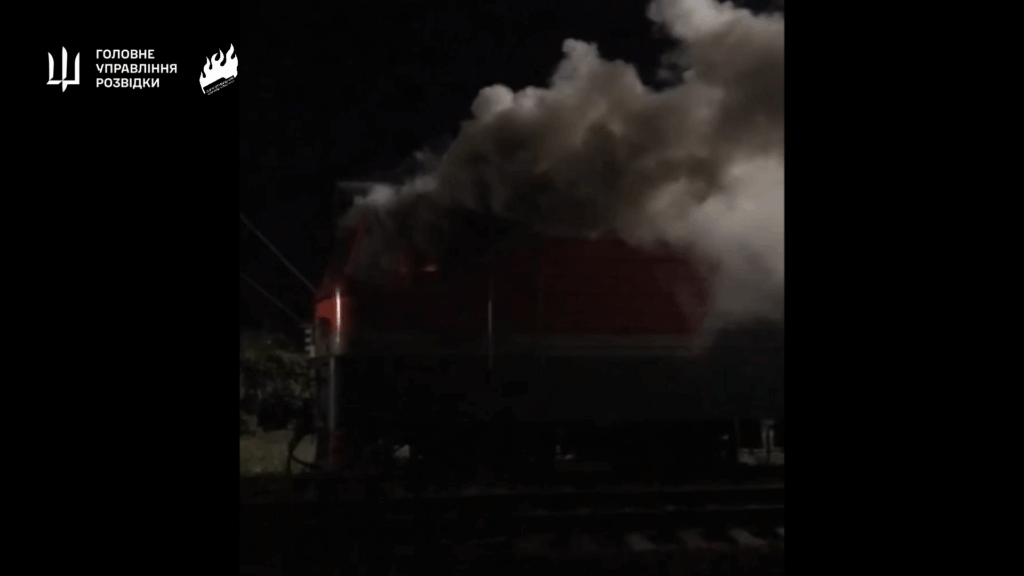

Ukraine’s military intelligence (HUR) said the anti-Kremlin partisan movement Freedom of Russia has carried out a series of sabotage attacks on Russian railway infrastructure, destroying dozens of locomotives used to transport military supplies to the front.
Since the start of Russia’s full-scale invasion of Ukraine, partisan movements have emerged both in occupied Ukrainian territories and within Russia itself, targeting military infrastructure and supply routes. Among them, the Freedom of Russia Legion - a group of anti-Kremlin fighters composed of Russian citizens opposing Vladimir Putin’s regime - has become one of the most visible.
According to a statement published by HUR on Thursday, the Freedom of Russia movement conducted coordinated operations targeting the logistics network of the Russian army. Using improvised incendiary devices, the partisans reportedly set fire to control and power systems of multiple locomotives across Russian territory.
“These locomotives were used by the occupiers to deliver weapons, ammunition, and equipment for the war against Ukraine,” HUR said. The agency added that the attacks “significantly slowed the movement of enemy resources and disrupted the stability of supply lines to Russian units at the front.”
In a separate statement on Tuesday, Freedom of Russia said its “resistance had delivered a series of powerful blows to Putin’s army logistics,” claiming that the operation destroyed “dozens of locomotives transporting weapons, ammunition, and equipment to the front.” The group said the damaged systems “burned out completely, making the trains impossible to repair.”
HUR described Freedom of Russia as one of the most active and effective resistance movements operating inside Russia since the start of the full-scale invasion.
Operating in coordination with Ukraine’s defense intelligence, the group has claimed responsibility for numerous acts of sabotage since the start of the full-scale war, including cross-border raids, railway disruptions, and attacks on military facilities aimed at undermining Moscow’s war effort from within.
Follow Euromaidan Press on Google News! YOUR SUPPORT = OUR VOICE

German conductor and pianist Justus Frantz traveled to Moscow this week to receive the Order of Friendship from Russian President Vladimir Putin, prompting calls in Berlin for his German state honors to be revoked.
During the 4 November ceremony in the Kremlin, Putin said that Frantz "has for many years conducted fruitful activities in bringing together and mutually enriching the cultures of Russia and Germany," according to DW.
The 81-year-old conductor responded in Russian, telling Putin: "All my life I wanted to play Russian music and work for your culture."
Roland Theis, a member of the German parliament from the Christian Democratic Union, called on German President Frank-Walter Steinmeier to cancel Frantz's Order of Merit of the Federal Republic of Germany. "Anyone who aligns themselves with a dictator whose, until now, hybrid military aggressions are directed against our country, can no longer be a bearer of the Federal Order of Merit," Theis told Politico.
Frantz is considered one of the leading figures in German classical music. In 1986, he created the Schleswig-Holstein Music Festival, turning it into one of the largest forums for classical music.
The musician has faced criticism for supporting the annexation of Crimea. In 2023, he was removed from the festival due to close ties with Russia, Deutsche Welle reports. Frantz gave concerts in Crimea and served on the jury of the Tchaikovsky Competition after Russia launched its full-scale war against Ukraine.
In February 2023, Frantz signed the controversial "Manifesto for Peace," an online petition by left-wing politician Sahra Wagenknecht calling for negotiations with Russia, according to Politico.
According to his website, Frantz has performed with the Berlin, New York and Vienna philharmonic orchestras, as well as the London Symphony Orchestra.
Since Russia's full scale invasion in 2022, cultural institutions across Europe and North America have canceled performances of Russian works and suspended collaborations with Russian artists who support the Kremlin. The Metropolitan Opera terminated contracts with Russian performers who refused to denounce the war, while major European festivals excluded Russian state-affiliated ensembles and musicians who maintained ties to Putin's government.
However, some Western cultural figures continue to maintain ties with Russia despite the war. Frantz is among a small group of musicians and artists who have defended Russian culture and appeared at events in Russia or Russian-occupied territories.


Moldova is breaking cultural ties with Russia. On 5 November, the Moldovan government officially approved an initiative to close the Russian Cultural Center in the capital Chișinău, known as the “Russian House", as per Nokta.
The Russian center organized so-called “educational” events, children’s competitions, and youth meetings to promote Moscow's narratives. In October, the center hosted a memorial evening for propagandist Tigran Keosayan, who supported the war against Ukraine. He was under sanctions by Ukraine, the EU, the UK, and Canada.
The decision has been made following the termination of the bilateral agreement with Russia regarding the establishment and operation of cultural centers in Moldova.
Under the agreement on cultural institutions, a Russian Center for Culture and Science was established in Chișinău in 2009 under the management of the Russian embassy.
Minister of Culture Cristian Jardan stated that the “Russian House” functioned not as a cultural center, but as an outpost of Kremlin influence.
“This center was not truly cultural under its cover; activities were conducted that undermined Moldova’s sovereignty,” Jardan emphasized.
Minister of Foreign Affairs Mihai Popșoi explained that the closure of the Russian center is a deliberate political move aimed at protecting national security.
The step was taken following the fall of Russian drones in southern Moldova: in Gagauzia and Taraclia. In May, the parliamentary committee on foreign policy supported ending the 1998 agreement with Moscow.
Despite previous announcements of closure, the “Russian House” had continued its activities, holding events with participants from the Russia-backed Transnistrian region. The center’s operations are now officially terminated.
The government stresses that the ending of the agreement will not have economic or legal consequences for Moldova.
This move sends a clear signal that Chișinău is decisively breaking away from Russian influence, opting for sovereignty and European integration.


© Doug Mills/The New York Times


Russia’s next-gen strategic bomber program may struggle to get off the ground if the West can prevent Moscow from evading sanctions, according to an investigation by InformNapalm, a Ukrainian intelligence community.
InformNapalm on 4 November reported that it acquired a trove of internal documents from Russia's aerospace component manufacturer OKBM, which the EU sanctioned in October. Purported copies of some documents were published with the investigation.
The papers show that development of the Poslannik strategic bomber and parts for the Sukhoi-57 fighter are running into delays. This is partly due to Moscow’s shortage of precise machining tools made by foreign companies that have left the Russian market. The documents linked by InformNapalm directly name this as a reason.
“At this stage, the Russian Federation is not able to produce parts for its promising aviation complexes on its own… they need to purchase foreign automated production equipment, high-precision CNC (Computer Numerical Control) machines,” InformNapalm wrote.
“This is why sanctions work and they are important, because they significantly hamper Russian military capabilities. But it is no less important to track schemes and ways to circumvent sanctions through third countries and impose secondary sanctions.”
According to the investigation, OKBM used Taiwan-made Hartford HCMC-1100AG and Johnford SL-50 machines, as well as a Serbian Grindex BSD-700U CNC grinder, bought through subsidies from Russia’s Ministry of Industry and Trade.
InformNapalm pointed to these acquisitions as examples of the Russian state’s attempts to evade sanctions.
The founder of InformNapalm, who goes by Roman Burko, told Euromaidan Press that the intelligence gathering operation directly contributed to OKBM being included in the latest sanctions package. The organization went public with the data to cause additional damage to the Russian manufacturers.
"Russian contracts explicitly state that information leaks lead to investigations, bureaucracy, and contract terminations," Burko said.
The Tupolev PAK DA, also known as the Poslannik (Russian for "Envoy"), is a subsonic stealth bomber meant to replace the venerable Tu-95, which dates back to the 1950s.
Russian media and other online sources report that the PAK DA is meant to have a range of 12,000 kilometers, an operational ceiling of 20 kilometers, and carry a conventional or nuclear payload of up to 30 tons. Moscow reportedly began financing development in the late 2000s and since then, the program has run into multiple delays.
Russian media previously reported that the bomber was supposed to be ready for serial production in 2027. According to InformNapalm’s investigation, OKBM is supposed to deliver components for actuating the Poslannik's weapon bays by August 31, 2027.
The documents released by InformNapalm state that the program is marked secret and OKBM may lose its contract if it fails to maintain that secrecy.
The investigation also found that OKBM is involved in making gearboxes for the weapon bays of the Sukhoi-57, a Russian multi-role stealth fighter with the NATO reporting name Felon.
The Su-57 has fought in the full-scale invasion of Ukraine. As of 2023, Russia had only 22 Su-57s in service, although it intends to increase production. Russia’s United Aircraft Corporation plans to deliver 76 fighters by 2027.
On top of modernizing its air force, Russia has entertained plans to export the Su-57 as a competitor to the American F-35 Joint Strike Fighter.
India initially participated in the development of the Su-57 but pulled out of the program in 2018, citing lack of satisfaction with performance and other concerns. In October, Russian Ambassador Denis Alipov made an offer to India to launch “local production” of Su-57s.
At least 70% of all Russian CNC machine tools are imported, largely from the US, EU, and Japan. Over 80% of all CNCs end up in Russia's military production facilities.
While Russian military manufacturing has suffered as access to this equipment dried up following the full-scale invasion, Moscow has been able to get its hands on foreign equipment either through intermediaries or foreign companies violating sanctions.
Ukraine's Economic Security Council reported that Russia has procured $18 billion worth of machine tools from both Europe and China. This includes 57 CNC machines worth over $26.5 million from European subsidiaries, along with components and consumables valued at more than $9.5 million.
In October, Germany raided Spinner, a high-precision machine tool manufacturer suspected of knowingly supplying equipment to Russia's military industry. Three individuals have already been charged with violating sanctions.
According to InformNapalm, the documents it released on 4 November are only a fraction of the total it has managed to acquire and go over, in partnership with the cyber analytics center Fenix. Ukrainian intelligence was also reportedly involved in the operation.
InformNapalm wrote that it plans to continue publishing leaks about OKBM into the future, with the hopes that publicity will help strengthen the impact of Western sanctions on Russia's military industry.

Last week I went to Dubai. I didn’t much like it; Dubai feels as if the brief was to build a city but to leave out all the things that make cities good. Then again, I was there for a crypto conference. And my overall impression of that was – if Western sanctions are indeed shutting Russians out of the world economy, someone should tell the Russians.
The free ice cream at the gate was sponsored by a crypto company promising seamless exchanges between roubles and the dollar stablecoin USDT; an exhibitor offered to deliver you cash in an hour when you transferred them some crypto; and the title sponsor was A7A5, fresh from being sanctioned by the European Union, but very much alive, kicking, and cheerfully distributing stickers to people who took a spin on its wheel of fortune.
The centre of the hall was dominated by a crypto-trading competition, in which a number of people sat behind screens and sought to make a profit while against the clock. Despite the best efforts of two fast-talking Russian MCs, as a spectator sport, it had all the charm of watching an HR department finishing up the month’s payroll. Still, the competition drew the biggest crowd simply for the lack of other things going on.
None of the whales that might once have come to a Dubai crypto conference were present, now all the action has spectacularly moved to Washington, DC. Check out this Reuters investigation into how much cash The Trump Organization has made in just the first six months of 2025: “the U.S. president’s family raked in more than $800 million from sales of crypto assets in the first half of 2025 alone”, with “potentially billions more in unrealized ‘on paper’ gains”, mostly from foreign sources.
Those who did make it to Dubai intoned the usual verities about crypto ushering in a new age of liberty, despite the huge contradictions all around them. Particularly bewildering was a panel featuring Vít Jedlička, a Czech libertarian and founder of “start-up nation” Liberland, alongside Nabil Arnous, whose job is to bring investment into “Innovation City”, a newly-renamed AI-powered free trade zone in the absolute monarchy that is Ras Al Khaimah, one of the seven emirates that make up the UAE. The blockchain is powerful indeed if it can unite people from such supposedly opposite political poles.
Subscribe to our Coda Currents newsletter
Weekly insights from our global newsroom. Our flagship newsletter connects the dots between viral disinformation, systemic inequity, and the abuse of technology and power. We help you see how local crises are shaped by global forces.
Even more head-scratching to me though was a presentation by Reeve Collins, who co-founded Tether and was an early advocate of all things crypto, He came to Dubai to pitch his idea for “white label” stablecoins which would allow companies to put their name on a dollar-pegged cryptocurrency while leaving all the hard work of running the blockchain to someone else.
Why might companies want to do that? Because every time they sell something, they get to collect even more data about their clients than they already do, as well as earning profit from issuing money that currently goes to the government.
“Since this is programmable money, you get real data on all of the users, and you get to understand who are the power-users, who deserves more, who deserves to be rewarded,” Collins said. “This is loyalty points times a thousand. It really will supercharge what companies are able to offer their users, so they'll be able to extract more value.”
I kept expecting someone to speak up and point out how far his vision had strayed from cryptocurrencies as a tool for individual autonomy, rather than a tool that enables the world’s largest corporations to frack humanity even harder than they are now. But no one did. Instead, the conference moved onto a panel about how governments couldn’t be trusted.
At some point the music will stop, and none of us will have chairs, and there will be an almighty blow-up. The prospect slightly terrifies me.
Kyrgyzstan's crypto compulsion
For now, though, the music is very much still playing. Particularly in places like Kyrgyzstan, which seems to be doubling down on its strategy of becoming a ‘cryptatorship’ like El Salvador. Binance founder Changpeng Zhao, the crypto billionaire who pleaded guilty to violating U.S. anti-money laundering laws and was recently pardoned by Trump – though the U.S. president claimed not to know Zhao – headed to Bishkek to talk up its transformation. “Had a great time in Kyrgyzstan in the past two days. I encourage more crypto companies to explore the country too,” he Xed.
There are already a number of crypto companies in Bishkek, including the sanctioned A7A5, and their close connections with the Kyrgyz government are of great interest to the country’s journalists. However, since Kyrgyzstan’s best investigative outlets – Kloop, Temirov Live and Ayt Ayt Dese -- have just been labelled as extremists, it will be difficult for reporters to bring attention to their findings.
“This is the first time in the history of Kyrgyzstan when media outlets have been labelled extremist,” said Kloop in a statement. “Now it is dangerous to like or share outlets’ material, or to circulate it. That could all be considered support for extremist organisations and the circulation of extremist material.” At least, “watching and reading it is currently safe.”
There used to be something admirable about Kyrgyzstan’s bloody-minded refusal to become a dictatorship like the other republics of Central Asia. Now there is something grotesque about the fact that it is the lure of crypto, a technology supposedly intended to enhance freedoms, that is helping to cement autocracy. The country is holding snap parliamentary elections on November 30. The president’s party, unsurprisingly, is expected to do very well.
Watching Kyrgyzstan heading towards autocracy is a reminder that the only plausible long-term solution to kleptocracy is for rich countries to stop enabling it. If Westerners started living up to their professed values, and made it impossible for crooks to buy property and launder money in the West, it would reduce the appeal of being one.
A version of this story was published in this week’s Oligarchy newsletter. Sign up here.
The post Dubai’s Blockchain Blues & the Kyrgyz ‘Cryptatorship’ appeared first on Coda Story.
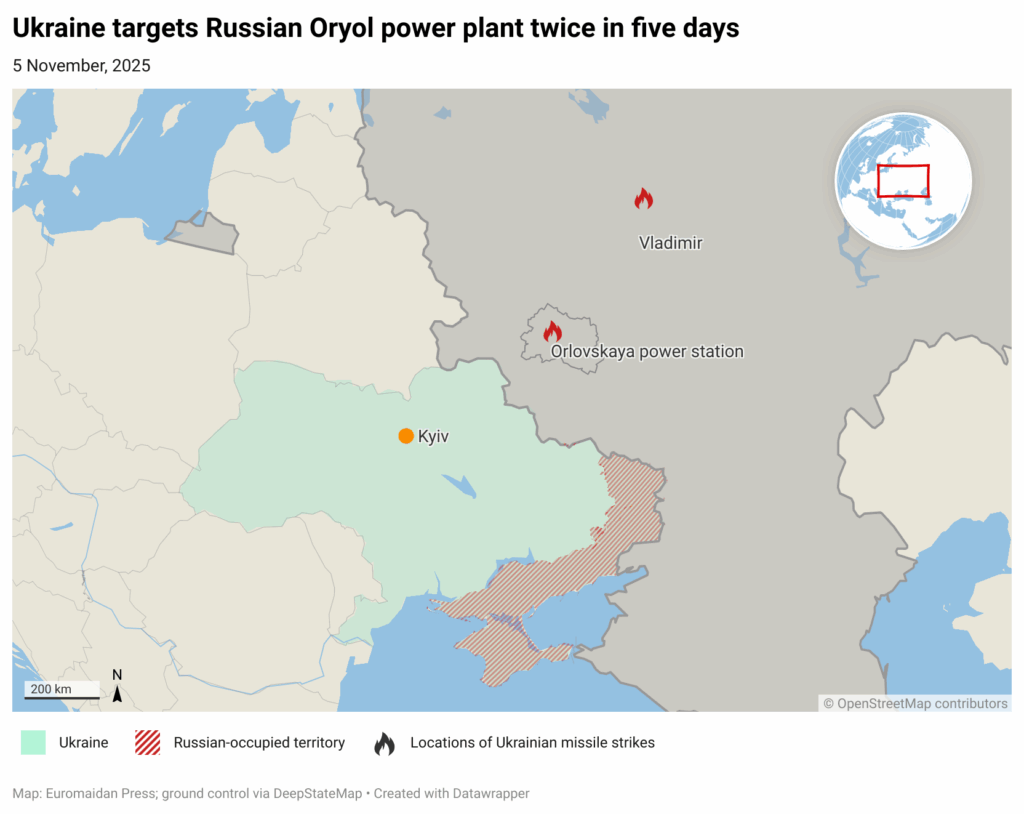

Missiles targeted the Oryol thermal power plant in Russia for the second time in the early hours of 5 November, according to videos and eyewitness accounts reported by Astra.
Local residents reported a series of powerful explosions near the city's thermal power station during the night.
"Sounds of a jet engine were heard before the explosions, indicating an attack by missiles or jet-powered drones," according to the reports. Local residents also believe the attack was carried out with missiles.
The governor of Oryol Oblast claimed that "air defense forces destroyed enemy UAVs, and debris damaged several private houses and an outbuilding." However, the published videos contain no sounds of air raid sirens in the city or the operation of Russian air defense systems.
The Oryol thermal power plant was previously attacked on the night of 31 October. According to the Ukrainian Navy, the facility was struck with Neptune cruise missiles at that time. The strike hit an open switchgear facility, causing massive power outages in the city.
The Oryol thermal power plant is the largest source of electricity and heat in the region, providing power system operations and heat supply for the city. "The installed electrical capacity of the station is 330 MW," according to the report.
Meanwhile, Ukrainian Defense Forces struck a high-voltage substation near the Russian city of Vladimir on the night of 4-5 November, Astra reports, citing Vladimir Oblast Governor Alexander Avdeev.
The strike hit the Vladimirskaya substation (750 kV) in the Energetik settlement near Vladimir. Videos show fire and smoke. Russian authorities have not officially confirmed the type of facility that was attacked.
Vladimirskaya reportedly is a major energy facility in the region. Its installed capacity is approximately 4,010 MVA. The substation serves as a hub with numerous power lines of 110-750 kV voltage, servicing the region's energy system. "Its stable operation is critically important for the reliability and balance of Russia's energy system," the report says.
The same substation was attacked by strike drones on 31 October 2025, when a massive fire broke out, captured on video and photos by eyewitnesses.
The day before the Oryol and Vladimir strikes, Ukrainian Defense Forces conducted a series of drone strikes on two oil refining infrastructure facilities in Russia, attacking the Sterlitamak petrochemical plant in the Republic of Bashkortostan and an oil refinery in Nizhny Novgorod Oblast.


© Finbarr O'Reilly for The New York Times
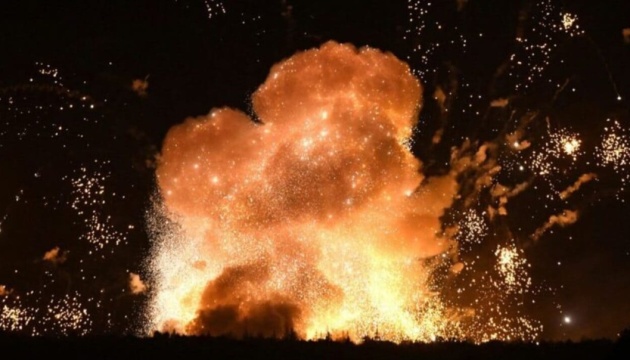

They failed to steal history. Ukrainian air defenders shot down the Russian army’s newest reconnaissance drone, "Kniaz Veshchiy Oleg", named after the ruler of Kyivan Rus, who, as legends said, could foresee the future, according to the 63rd Separate Mechanized Brigade.
“At the same time, in the swamps where Moscow would later rise, frogs croaked. Naming your drone after a proto-Ukrainian warrior and politician is just another attempt to steal our history,” the 63rd Brigade added.
Despite its grandiose name, the Russian drone failed to predict its own destruction.
“For the first time in the history of this war, Ukraine has recorded the downing of Russia’s newest reconnaissance drone with the peculiar name "Kniaz Veshchiy Oleg", the statement concluded.
Earlier, the Ukrainian Defense Intelligence, also known as HUR, destroyed the base of Russian invaders belonging to the most elite and secretive drone Rubikon center in Avdiivka in Donetsk Oblast.
The Rubikon unit specializes in the use of unmanned systems, including combat drones, during Russia’s genocidal war against Ukraine. It is considered one of the most effective and combat-ready structures of the Russian army.


The situation in Pokrovsk, Donetsk Oblast, is absolutely critical. Russian occupiers continue to amass forces. The DeepState monitoring project reports that the invaders have already established control over parts of the city, setting up positions and logistics hubs to support further infiltration.
Capturing Pokrovsk would significantly strengthen Russia’s foothold in eastern Ukraine and pave the way toward key cities like Kramatorsk and Sloviansk. The Kremlin seeks to use the city's occupation symbolically to push the narrative that Ukraine must withdraw its forces from the east.
At the same time, Ukrainian soldiers continue to carry out clearing operations and neutralize Russian troops using all available capabilities, with drone pilots playing a key role in securing Pokrovsk.
The occupiers are attempting to secure the area between Pokrovsk and Hryshyne, while Ukrainian special units continue clearing operations to maintain control of this critical logistical corridor.
“However, this does not solve the main problem — blocking the Russians on the southern outskirts to prevent further infiltration into the city. Given that they are already establishing positions and taking control of the area, this possibility is effectively lost," the experts say.
The situation also threatens Myrnohrad, Pokrovsk's twin city, with being cut off entirely from the outside world.
"Its capture would be especially damaging because the occupiers could take it without even properly fortifying their positions," the DeepState experts add.
Meanwhile, Spokesperson for the 7th Rapid Response Corps of the Ukrainian Air Assault Forces Serhii Okishev says that active operations are ongoing in the northeastern part of Pokrovsk to clear Russian occupation forces, according to Ukrinform.
Donetsk Oblast is expected to remain the epicenter of fighting this winter, as Russian forces received a looming “deadline” to fully occupy the region by the end of February.
Okishev notes that Russian forces are using artillery, drones, and guided aerial bombs. The fighting is concentrated both within the city and along the flanks of the defensive line.
Putin sets deadline for Pokrovsk conquest, throws 17,000 more soldiers thrown into burning city
Russian troops are attempting to advance through the urban areas and establish positions on the outskirts.
Fighting continues in the Pokrovsk area between Ukrainian special forces and Russian occupation troops. The operation aims to protect a strategically important logistical area and neutralize Russian attempts to expand their fire control over critical supply routes.
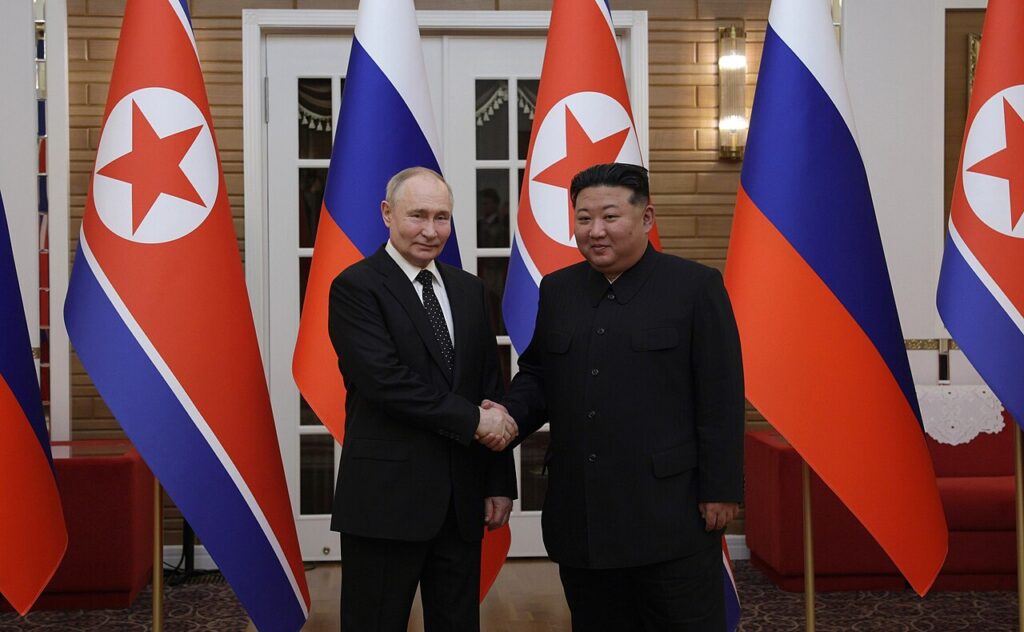

South Korea’s intelligence service has reported that around 5,000 North Korean construction troops have been dispatched to Russia since September, to assist with “infrastructure reconstruction,” according to a lawmaker briefed on the findings, AFP reports.
The deployment marks a deepening of military and economic ties between Moscow and Pyongyang, which have strengthened since Russia’s full-scale invasion of Ukraine. North Korea has already supplied Russia with artillery shells, missiles, and other munitions in defiance of UN sanctions, helping sustain the Kremlin’s war effort.
According to lawmaker Lee Seong-Kweun, the troops have been moving to Russia in phases and are expected to be deployed on reconstruction projects. He said the intelligence service had detected “continued signs of training and personnel selection” for additional deployments.
South Korea estimates that around 10,000 North Korean personnel are currently deployed near the Russia-Ukraine border. At least 600 North Korean soldiers have died in the war with Ukraine and thousands more have been injured, according to South Korean intelligence.
The report also said North Korean leader Kim Jong Un has grown more confident since aligning closely with Moscow and Beijing. Pyongyang has strengthened ties with Russia, and Kim’s foreign minister Choe Son Hui recently met with President Vladimir Putin in Moscow to discuss deeper cooperation.
A UN sanctions monitoring group recently reported that North Korea plans to send 40,000 labourers to Russia, including IT workers, despite a ban on overseas work under international sanctions.


© Associated Press


© Andrei Bok/SOPA Images, via Getty Images
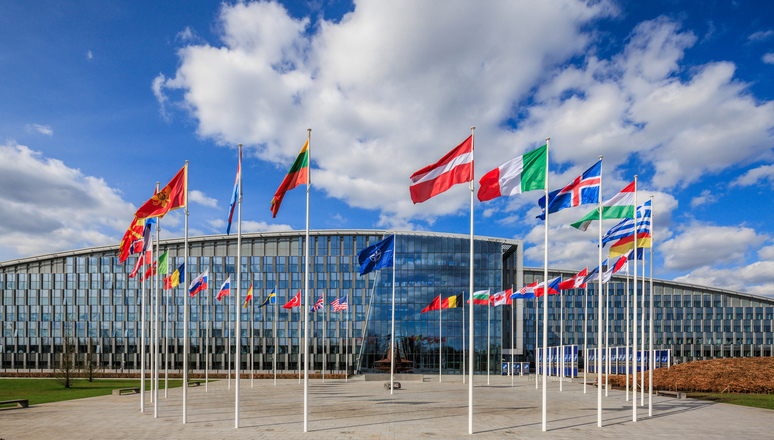

Belgium, home to NATO's headquarters, has acknowledged the security problem to counter waves of drones spotted in many European states this fall. The country has admitted it is struggling to deal with the targets spying on a critical military base that hosts its advanced fighter jets, Business Insider reports.
Theo Francken, the Belgian defense minister, said on 2 November that the country detected at least three large drones flying high above the Kleine-Brogel air base in a single night.
The base, in northeastern Belgium, houses the country’s fleet of F-16 Fighting Falcons, and Brussels plans to station its new F-35 Lightning II aircraft there.
It is also believed that the US stores several dozen nuclear weapons at Kleine-Brogel as part of its nuclear deterrence strategy in Europe.
Francken said that a deployed drone jammer failed to neutralize the drones. He suggested that the failure might have been caused by issues with distance or by the jammer not being tuned to the correct radio frequency.
He added that a police helicopter and several vehicles were mobilized to pursue one of the drones, but they eventually lost track of it after following the system for several kilometers.
Francken said that “additional counter-drone air systems are urgently needed.”
Although he did not specify who was operating the drones, European leaders have repeatedly suggested that Russia is behind a series of recent similar incursions into NATO territory.
On 28 October, Ukrainian President Volodymyr Zelenskyy said that Russia employed oil tankers to launch and control drones targeting European nations. This way, the launch of drones may be invisible.
A series of incidents has pushed Europe to look for cost-effective ways to counter enemy drones, which are often much cheaper than the interceptors NATO has traditionally relied on for aerial threats.
Some NATO allies, including Denmark and Poland, have sought to strengthen their air defenses with help from Ukraine, which frequently faces hundreds of Russian drones in a single night.